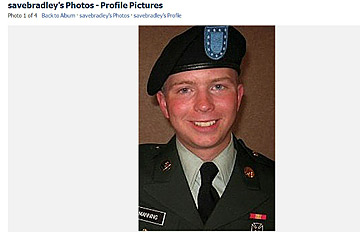
Army Private First Class Bradley Manning is being held in Virginia for allegedly providing WikiLeaks with hundreds of thousands of classified government documents
Army Private First Class Bradley Manning sleeps under tear-proof blankets. Guards check on him every five minutes; if his face isn't visible, they wake him to make sure he's O.K. And every night that he spends at the Marine brig in Quantico, Va., for allegedly providing WikiLeaks with hundreds of thousands of classified government documents, he is stripped naked, ostensibly for his own safety.
A Marine Corps spokesman, First Lieutenant Brian Villiard, says brig officials made an "event-driven" decision to order Manning's nighttime nudity, but would not provide details, citing Manning's privacy. Manning is being held under "prevention of injury" status, Villiard says, a condition short of a full-fledged suicide watch. Technically, Manning is not in solitary confinement, but he is a "maximum-custody detainee," kept alone in his cell 23 hours each day. "There is no punitive intent for what takes place at the brig," Villiard maintains.
"I see this as America lapsing into the very kind of conduct we have condemned in other countries, and this has a painful resonance with Abu Ghraib," Ohio Democratic Representative Dennis Kucinich, an outspoken critic of U.S. detention policy, tells TIME. Kucinich says he has been trying to meet with Manning for more than a month but has been stymied by the Pentagon.
But some liberals and free-speech advocates are bristling at more than the conditions of Manning's confinement. His case is part of a trend under the Obama Administration, which is rapidly establishing a record as the most aggressive prosecutor of alleged government leakers in U.S. history.
If the Obama Administration were to prosecute WikiLeaks founder Julian Assange, it would be the sixth time the Administration has pressed charges against defendants suspected of leaking classified information. The government has only ever filed similar charges three times over the last 40 years. The most famous was the Nixon Administration's prosecution of Daniel Ellsberg for leaking the Pentagon papers to the New York Times.
In addition to Manning's case, some of the other prosecutions under the Obama Administration have generated particular controversy. The Administration is prosecuting former CIA official Jeffrey Sterling for allegedly leaking information to New York Times reporter James Risen. Sterling's attorneys filed a brief with the U.S. Court for the Eastern District of Virginia in February showing that federal law-enforcement officials had obtained Risen's credit reports, credit-card and bank statements and airline-travel itineraries.
That revelation caused alarm among free-speech advocates. Justice Department rules only allow subpoenas of a reporter's records if the information is vital to a case and cannot be obtained any other way. Steven Aftergood, who tracks government secrecy at the Federation of American Scientists, says the brief shows that law enforcement was spying on Risen directly, pointing to "information that would not be available from surveilling Sterling."
Last August, the Obama Administration also prosecuted a State Department analyst, Steven Kim, for allegedly leaking secret information about North Korea to a reporter. Kim, who says he is innocent, was charged with illegally disclosing national-defense information and lying to the FBI. He could face 15 years in prison.
Another advance on the secrecy front is the successful prosecution of former FBI linguist Shamai Leibowitz last May. Leibowitz is serving 20 months in prison for leaking undisclosed information to an undisclosed blogger. In court, Leibowitz said he was trying to expose unlawful activity, but he cannot reveal what he leaked as part of a plea deal with the government.
Justice Department officials say all decisions to level charges under the Obama Administration have been made on their merits, not to dissuade whistle-blowers. And many Democrats and Republicans in Congress want to make prosecuting government leaks easier, arguing that modern technology has made massive amounts of sensitive information easy to distribute and more devastating leaks increasingly likely. Maryland Democratic Senator Benjamin Cardin last month reintroduced legislation that would facilitate prosecution of officials accused of government leaks by prohibiting the distribution of any classified documents. The current system only prohibits dissemination of certain categories of information like communications intelligence. "Our laws need to keep pace as physical blueprints, photographs, maps and other documents have been transformed by technological advances in information gathering and dissemination, especially e-mail, the Web and simple flash drives," Cardin said. It was a flash drive that Manning allegedly used to capture government data.
But whistle-blower advocates are also concerned by another type of case moving forward on Obama's watch. Former NSA official Thomas Drake might serve years in prison, not for leaking intelligence, but for telling the Baltimore Sun that the NSA was allegedly wasting taxpayer money on ineffective technologies. He was charged with mishandling classified material and obstructing justice in April 2010. At publication time, the Justice Department had not responded to queries about specific cases.
The prosecutions of those five leakers strike some, like Kucinich, as inconsistent for a President who signed a January 2009 memo to top government executives encouraging more transparency. "The Government should not keep information confidential merely because public officials might be embarrassed by disclosure, because errors and failures might be revealed, or because of speculative or abstract fears," Obama wrote. "President Obama came to office promising a new transparency," Kucinich says. "We are getting the opposite."
Others see the prosecutions as a warning shot to leakers a long time in the making. "In every case, the decision to prosecute was made in the Obama Administration even when the alleged disclosure took place years ago," Aftergood says. "I think Obama, like every other President, has been appalled by the unauthorized disclosure of internal Administration deliberations, and he has sent out a signal that they should be forcefully repudiated."
